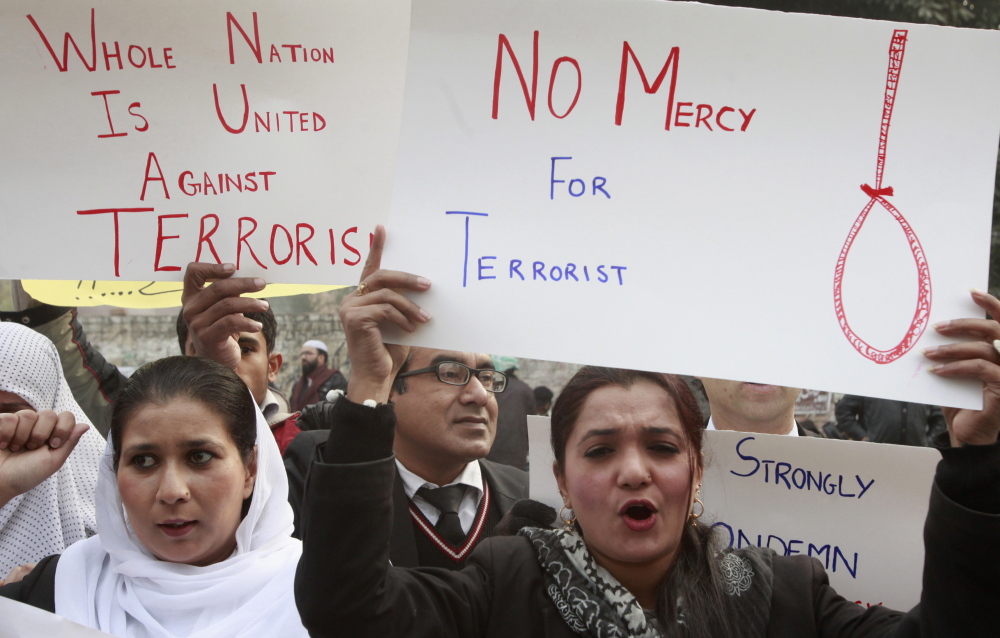ISLAMABAD — Pakistan’s government fast-tracked warrants of execution for convicted terrorists Thursday, moving swiftly on its promise to crack down on militants after a Taliban massacre of 132 schoolchildren Tuesday in the northern city of Peshawar.
Prime Minister Nawaz Sharif had lifted a six-year moratorium on capital punishment Wednesday, vowing to eliminate terrorists in Pakistan regardless of whether they targeted it or neighboring Afghanistan or India.
On Sharif’s orders Thursday, the country’s ceremonial president, Mamnoon Hussain, rejected 17 mercy petitions that convicted terrorists on death row had filed earlier. The army chief of staff, Gen. Raheel Sharif, who’s no relation to the prime minister, also signed six so-called “black warrants” for the execution of soldiers convicted of terrorism offenses by military courts.
Officials said those 23 terrorists would be executed within days, and they’re likely to be followed by dozens more hangings at prisons around the country.
The federal government and its four provincial counterparts worked overnight Wednesday and through Thursday to draw up lists of which prisoners would be sent to the gallows. Initial estimates have put the number of convicted terrorists awaiting execution at more than 3,000.
Pakistan’s chief justice, Nasirul Mulk, told lawyers gathered at the Peshawar high court Thursday that he’d convened a meeting of all the country’s high court judges to plan the rapid conclusion of appeals filed by terrorist convicts on death row.
Pakistani news reports Thursday varied in their estimates of the number of prisoners who’ll be put to death in a first wave of executions, but their anonymously sourced reports suggested that they’d number 60 to 80.
They’d include the perpetrators of many high-profile terrorist attacks, including the leader of an October 2009 attack on the army’s headquarters in Rawalpindi, in which 10 soldiers died.
Unconfirmed reports said those being lined up may also include Omar Saeed Sheikh, convicted of the 2002 murder of Wall Street Journal reporter Daniel Pearl in the southern city of Karachi.
The government acted as public grief at Tuesday’s school massacre turned into angry demands for decisive action to end a seven-year Taliban insurgency that’s claimed more than 60,000 lives.
The death toll from the Peshawar attack rose to 148 on Thursday, as four more people succumbed to their wounds at the city’s Lady Reading Hospital.
“There’s not a street in the city without a household in mourning,” local journalist Ghulam Dastageer told McClatchy.
Casting aside years of fear, hundreds of civil society activists gathered Thursday evening for a candlelight vigil outside Islamabad’s Red Mosque, the flash point that triggered the Taliban insurgency. After terrorizing the capital’s residents for months, some 300 armed militants and seminary students were killed in July 2007 in a special forces assault on the mosque.
The imam of the mosque, Mullah Abdul Aziz, has been a focus of public anger after he refused to criticize the perpetrators of Tuesday’s school attack.
Send questions/comments to the editors.



Success. Please wait for the page to reload. If the page does not reload within 5 seconds, please refresh the page.
Enter your email and password to access comments.
Hi, to comment on stories you must . This profile is in addition to your subscription and website login.
Already have a commenting profile? .
Invalid username/password.
Please check your email to confirm and complete your registration.
Only subscribers are eligible to post comments. Please subscribe or login first for digital access. Here’s why.
Use the form below to reset your password. When you've submitted your account email, we will send an email with a reset code.